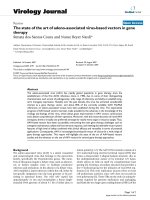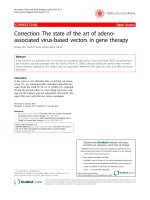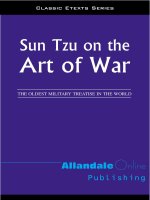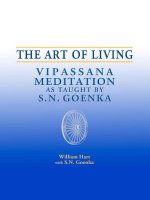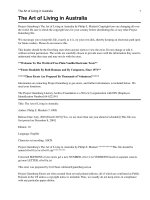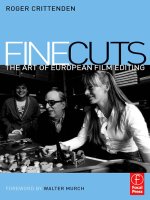BẢO ANH LẠC BOOKSHELF 39 THE ART OF LIVING NGHỆ THUẬT SỐNG (BILINGUAL LANGUAGE: ENGLISH-VIETNAMESE)
Bạn đang xem bản rút gọn của tài liệu. Xem và tải ngay bản đầy đủ của tài liệu tại đây (2.09 MB, 83 trang )
Bảo Anh Lạc Bookshelf 39
THE ART OF LIVING
NGHỆ THUẬT SỐNG
(Bilingual language: English-Vietnamese)
Thích Nữ Giới Hương
Nhà Xuất Bản Hồng Đức 2020
Huong SenBuddhist Temple
19865 SeatonAvenue,
Perris, CA 92570, USA
Tel: 951-657-7272 , Cell: 951-616-8620
Email:,
Facebook: /> Web:www.huongsentemple.com
Copyright@2020 by Bhikkhuni Gioi Huong, Sunyata Pham, Huong
Sen Buddhist Temple in the United States.
All rights reserved.
CONTENTS
Introduction
1. The Art of Living is to be Proactive and Fulfilles ......4
2. Know How to Create a Good Environment for
Ourselves and ther ....................................................8
3. Know How to Raise up the Mind and Persevere Intil
Destination is Reached ............................................12
4. Hold the Happy Key: Avoid Handing it to Others
.................................................................................18
5. Know How ro Control our Feeling ...........................21
6. Art of Recognizing Errors, Smiling and Gratitude ....26
MỤC LỤC
1. Nghệ Thuật Sống Có Nghĩa Là Chúng Ta Biết Chủ
Động Và Biết Đủ Trong Cuộc Sống. ........................37
2. Biết Tạo Môi Trường Tốt Cho Mình Và Gia Đình . . .41
3. Biết Cách Kiên Trì Vươn Lên Cho Đến Khi Thành
Tựu ...........................................................................45
4. Không Ủy Thác Người Khác Nắm Giữ Chìa Khóa
Hạnh Phúc Của Mình ................................................50
5. Biết Cách Chế Ngự Tình Cảm Của Mình .................54
6. Biết Nhận Lỗi Và Tỏa Nụ Cười Biết Ơn ...................59
INTRODUCTION
The Art of Living is a crucial subject for every
human being in the world, regardless of time and
location. The Buddha taught the principle of nourishing
the mind and body in the present and the future: "Not
getting caught in the dust of fame, returning to inner
enlightenment and cultivating the mind." Mencius
wondered how the peaceful way looks: “People are
finite, but man's greed is infinite. How can we have a
peaceful life and see through people's hearts amid this
hustle and bustle of life?” Tun-Mo-Zi (Tôn Mạc Tử)
revealed the art of making the body live a long life:
“The four limbs exercise hard, eating and drinking
regularly, chewing, swallowing slowly, after washing
face and mouth, and having adequate sleep." Xuan-Zi
(Tuân Tử) compared the way of mind like a lake: “The
heart is like water in a bowl; pouring it gently then the
water is clear. If our heart is stillness and our mind is
calm like water in a lake, what else can affect us?”
The Most Venerable Jing-kong (Tịnh Không)
questioned: "At present, people do not read the holy
sage scriptures, so they completely chase and depend on
their afflictions." There are many valuable teachings
advocating calmness, letting go of material things,
living in harmony with nature, cultivating the
spirituality of the Buddha and the predecessors, which
we are too busy to remember. This booklet tries to
introduce some philosophies of life with well-illustrated
stories from real-life experiences of the ancient saints.
With that aim, it can provide a guideline for long-lasting
health and moral life to all readers.
We would like to gratefully acknowledge with
special thanks Bhikkhunī Viên Quang, Bhikkhunī Liên
Hiếu, and Pamela C. Kirby (editors who worked as my
assistants for English translating, proofreading, design
and publication).
We rejoice in introducing readers near and far to
the Dharma and invite corrections and comments from
our readers to be incorporated into future printings. We
look forward to hearing from you.
Hương Sen Temple, November 2019.
Thích Nữ Giới Hương
Hương Sen Press, USA.
THE ART OF LIVING
In everyday life, everyone turns around with
stressful busy work from house, temple, company,
family, and personal life. How to get balance in life
with work and spiritual practice to live longer and
more meaningful lives? A Chinese proverb teaches,
"Knowing is to live; without knowing is death."
Therefore, we need to know how to live in a timely
fashion that is appropriate for our lives. It should be
as meaningful as the way of life of philosophers,
saints and those with high moral standards. These
great people have handed down to us the beautiful
words and holy patterns so that we know how to live
for the sake of ourselves and others.
The 14th Dalai Lama said, "Learning to be a
human being is a fact that we learn our entire life."
Our learning is processed and morality is cultivated.
The Dalai Lama, when asked what surprised him
most about humanity, answered, "Man! Because he
sacrifices his health in order to make money. Then he
sacrifices money to recuperate his health. And then he
is so anxious about the future that he does not enjoy
the present; the result being that he does not live in
the present or the future; he lives as if he is never
going to die, and then dies having never really lived.”
The 14th Dalai Lama taught that many people go out
1
for work and engage in two or three jobs at a time to
earn money to get rich. We worry about the future by
building a career because we think we will live long.
We never think that unexpectedly our health will
collapse one day and we must die. We leave life
behind with our empty hands.
Those who know enough will not sell their life
for profit, nor be worried about loss or success. The
14th Dalai Lama advises us to balance our work and
spiritual practice time. Many professors, doctors,
directors are always busy with no time for their
personal life and family. They keep telling their
beloved ones that they are busy due to work. They
say wait for some time to finish the projects then they
will lead the whole family to the temple to chant or
study or travel abroad. But this never happens as they
move from job to job. They have no time for their
wives, husbands, children, families and when they
overwork, they will easily become ill. Impermanence
is present, the death God knocks at the door and
leaves them in regret.
2
There are many lessons in society that teach us
that we need to balance our lives, our work and
spiritual practice time. In the West, Europeans and
especially the United States, have many jobs and
shifts day and night. They are busy throughout the
year, have little time for spiritual practice. Ms. Marry,
a resident of Perris, California, said: “I like to practice
meditating leisurely, but now I work three shifts a
day.
I am waiting for retirement and then I will
study meditation.” Meanwhile, Indians, Bhutanese or
Tibetan people work very leisurely; most of them
engage in only one job (about six or seven hours each
day). They spend more time in spiritual practice. In
the morning before going to work, in the afternoon
and at night they pray to their religious images. They
think that there is no need to build many beautiful
houses; life is temporary.
3
They must live simply to have the time to
penetrate spiritual philosophy. This is in stark contrast
to the lifestyle of Americans or Europeans who work
very hard, often with two or three jobs to cover the
costs of necessities. Therefore, the Buddhists here are
blessed to be near the temple and after their working
hours, should take the time to go there to listen to
Dharma or chant to balance their life. In this way, we
know the art of living, the balance to maintain
happiness and peace for ourselves, families and
everyone around us. Each person has many life
experiences. Now in this lecture, please let us suggest
some ideas as follows:
1. The Art of Living Is to be Proactive and
Fulfilled
We must earn a livelihood for ourselves and
families, but the spiritual practice is also very
important. Iit is good karma that makes our mind
calm and balanced in life and work. Thanks to these
nourishing materials, we can overcome difficulties in
life and look forward to good things in the future. So,
do not lean on money or material goods to make us
happy. There is an ancient saying, "Money cannot
buy inner peace. Money cannot cure a torn
relationship or make a meaningless life have
meaning.”
4
Money can buy a house but cannot buy a
family home. Money can buy a bed but cannot buy
comfortable sleep. Thus, only the love, humanity,
morality or religious relationship make our lives
meaningful. Money is just a supplement.
Here is a story for those who want to
contemplate the inner life and not consider material
possessions. There was a man whose job was making
leaf baskets. His life was very poor, but he was happy,
peaceful and introverted. Every day, he went to sell a
basket in the village. He had been weaving baskets
while reciting the Buddha's name, sometimes singing
and feeling his life well balanced and happy. He takes
meals with a few coins from selling the basket and at
night he returns to his simple tent to sleep. At that
time, he always feels his life simple, happy and
enjoyable. One day, a millionaire passes by, sees the
basket man living in poverty and earning little money,
so the millionaire gives him $10,000 USA. He holds
the $10,000 in his hand; he feels shaky because he
has never held such a large amount. He begins to feel
nervous as he starts thinking how to keep $10,000
safely. He does not know where to keep it when he
goes back to his tent. He is afraid of stealing or mice
eating his money. All night, he feels too uneasy to
sleep.
5
Next morning, he goes the village to continue
basketing and ponders where this $10,000 should be
deposited. Since he has this money, he can not sit and
sing happily as he used to. He thinks this money is
making him lose peace and happiness. Finally, one
day, he went to meet the millionaire and told him,
“Let me return this $10,000 to you; let me earn my
own living every day so that I can find my happiness,
joy and peace as I had before." Zen masters or
hermits often live very simply, just like that. Even
without property and wealth, they feel peaceful.
Another story tells us about a thief who
entered a Zen master's tent to steal things, but he
could not find anything. The Zen master told him
there was a moon above, please take it away. This
story suggests that when we live without wealth or
clinging, or relying on anything, we are very
peaceful. On the contrary, when we have many
possessions, our life become heavy, anxious and
attached like the basket man with $10,000. The art of
Buddhism is that we have “less desire and feel
satisfied” with whatever we have. Avoid attaching to
material wealth; live simply, be happy with what you
have. Greed is the desire without bottom; people have
more, want more without stopping. "Less desire"
means do not dream so high based on reality.
6
Desire does not bring us anywhere. On the
contrary, the Buddha taught instead of much
dreaming, take action. The image of a thousand arms
and eyes symbolizes action. Instead of dreaming, you
should engage. People have only two hands but the
statues of the Buddhas or Avalokiteśvara Bodhisattva
have thousands of hands, which means they engage in
actual action.
When investing in a certain job, it is necessary
to implement the plan, step-by-step, implementing
carefully and meticulously. The Buddha taught that
instead of dreaming of a flock of chickens, we must
arrange how to have more eggs. After that, thanks to
the process of hatching, the eggs will produce chicks.
Dreaming without realism and action will only bring
more frustration. Leading a simple life is the
wonderful truth of the Buddha. Despite having
sufficient material facilities, true Buddhists do not
consume all but help and share with others. Thanks to
practice. Buddhists attain a peaceful mind and do not
hesitate to bring Dharma everywhere. Sharing the
merit and Dharma with everyone, we do not enjoy
these qualities alone. We transmit the wisdom torch to
illuminate the world for the sake of life and
Buddhism. Whatever benefit has been obtained today,
please share with the near and far brothers and sisters.
7
Walking in Zen Garden of
Hương Sen Temple in May 20 2019.
2. Know How to Create a Good
Environment for Ourselves and Others
Here we are living close to the temples,
masters and Buddhist friends to listen to Dharma,
chant scriptures and practice spiritual development.
Those who do not have such a cultivated environment
find it more difficult to have the conditions for
spiritual practice and progress. The art of living is the
art that tells us how to create a good practice
environment for ourselves and everyone.
In other words, the moral educational
environment is very important; it determines every
person's happiness in life. A story explains this: There
8
were two families—of a robber and a teacher. Each
family had a son who was born on the same day and
time. The family of the robber thought that he would
change his child’s karma by sneaking him over to the
teacher’s family and switching the boys. He thought
that action might change the fate of the two boys. The
son who was nourished in the robber’s family grew
up to become a thief even though he was born into a
teacher's family. The boy who was born into a
robber’s family grew up to become a teacher, thanks
to being nurtured in the teacher's moral family.
Another story, the “Three-time Changing
House Story of Mencius’ Mother” tells us tells us of a
mother who hopes that her children will live and
grow up in the best living environment. Mencius’
house was near the cemetery, so Mencius often went
to the cemetery to play. He was crying as he saw
people (the deceased’s beloved ones) wearing white
bands on their heads and mourning. Mencius imitated
exactly what he saw. He also laid down on ground to
cry miserably, as if at a funeral, as if he had lost his
relatives forever. As his mother realized what he was
doing, she thought that place was not suitable for her
child, so she moved away. For the second time, she
moved to a nearby market. Mencius found that people
cheated when they weighed food. He was too young
to distinguish what was right or wrong, so Mencius
9
also imitated their business practices and also
weighed fraudulently. Mencius’ mother now thought
this place was also not suitable for her child. She
must move to another place. For the third time, she
moved to a home near the school. When he got close
to the school, Mencius saw masters and friends
reading and studying, so Mencius also learned to read
and write.
Finally, Mencius became a world philosopher.
Later, when he had a neighbor who killed pigs,
Mencius asked his mother what they killed the
animals for and Mencius’mother accidentally
answered that they were killing pigs to feed him.
After that, because she did not want her child to learn
to tell lies, she must go buy pork to let Mencius
eating for keeping her promise. Once when the
mother was weaving cloth, Mencius escaped from
school. She took the knife and firmly cut into the
fabric loom to make the loom in pieces and declared,
"Hiding from school is ruined like mother weaves
wrong and the cloth becomes bad.” From that
teaching, Mencius began to study hard
wholeheartedly and followed his mother's teachings.
Eventually, he became the best student in class and
later, he became a sage.
The educational environment is very
important; it determines the characteristics of a
10
person. The art of living is knowing how to create a
moral and spiritual environment for ourselves,
families and those around us. The more temples are
built, the fewer prisons are needed. The more
Buddhists come to temples to practice, the less sins
they commit. The temples are good places that have
the facilities to nuture and develop our holy spiritual
life. Creating a moral environment is very important.
We should support conditions and construction
of spiritual places to lessen criminal activity. The art
of living helps to shape us in a holy manner. Just as
when we make a cake, we must put the dough in the
mold. When we take out the cake, we will get a round
or square cake depending on the round or square
frames. Likewise, all the sacred or artistic teachings
of our predecessors have been handed down to us as
the nice frames. We keep ourselves in holy shapes in
such a way that we will gradually become improved
ones. The ancient people often taught, "Learning how
much is not enough; understanding how much is not
excess; please do not sell or buy virtue, success or
loss is not attached to the wise.” That is the art of
living as a upright human being.
11
L
eft on: Mr.Chánh Hảo, Rev. Diệu Hoa,
Author Ven. Giới Hương,
3. Know How to Raise up the Mind and
Persevere Until Destination Is Reached
The title of living art is very vast, like the big
ten worlds. The art of living is rich in many aspects of
life, such as the environment, morality, perseverance,
diligence, avoiding seduction (not relying on money
or lust). This art of life teaches us to balance many
things. Success is sometimes not something we see
right away, so we should not give up, keep
persevering, then we will reap results gradually. It's
like when we go out in the early morning dew, even
though we don't see the dew, if we stay outside for a
12
long time, we feel cold because our clothes are
gradually getting wet. Our practice is same as the
dew. If we continue to persevere deligently, we will
gain the results slowly.
Concerning the persistent effort to reach good
goals in life, I would like to tell a story called “The
Basket Contains Coal.” There was a grandson living
with his grandfather. His grandfather was seventy-
five years old; the grandson was eight years old.
Every day, the grandfather read holy books in the
morning. For 365 days a year, he would read holy
books without missing a day, even when he was sick.
The boy saw that and asked, “Dear Grandfather, I find
difficult to read books like that, I don't understand the
meaning, and I forgot the content. In contrast, I think
that if I go to grow in the paddy fields, I will have a
rice to eat, or if I plant cassava, I will have noodles. I
feel this is more practical, while every day you read
the scriptures; it is of no benefit at all. Grandfather
lovingly told the boy, "There are lots of interests and
benefits.
So, I try to read. ” The boy heard him say that
and he imitated his grandfather’s practice. At 4:00
a.m. when grandfather got up to read, boy also set up
a chair next to his grandfather to read. While reading,
he kept looking at grandfather because he felt bored
—he didn't understand anything. Then he said,
13
"Grandfather, I read but I don't understand anything.
You taught me a little bit and again I forgot it. Maybe
you better let me play football outside.” At that time,
it was winter and they used the fireplace for keeping
warm. After removing the charcoal, grandfather put a
dirty bamboo basket with coal dust in front of the boy
and said, "Now take the charcoal basket out and bring
me a basket of water.”
The innocent boy obeyed happily and ran out
to carry a basket of water. But when he came to the
fireplace, there was no water left. The boy said, "It is
clear that I have filled the basket with water but there
is no water left here." Grandfather told him, "Oh!
Probably you ran slowly. Now, increase your speed to
the same level as a runner.” The boy listened, went
back and continued to scoop out a basket of water and
run for the second time, but with the same result, the
water was no longer in the basket. At that point, the
grandfather said, “Well, now you must run double the
speed; increase your steps again." The boy ran away
like before. But this time he was smarter. He ran back
to grab the vessel filled with water and said,
"Grandpa! You need water; here is the water vessel
for you.” Then the grandfather replied, "I don't need a
water vessel
I need a wooden basket of water." The boy
responded: “Grandpa! I find this useless. It’s just like
14
in the morning when I read scriptures, but don’t
remember anything, it is useless. The grandfather
replied, "Boy, it's not in vain, look back at the basket.
The dirty coal basket is clean and not as dirty as it
used to be.”
What does the story teach us? It explains the
lesson about reading and practicing the scriptures
diligently every day. If we do that, we are bound to
achieve sila-concentration-wisdom. We should avoid
having negative thinking, like expecting a certain
outcome when we recite the sutras. Sometimes, bad
things happen, even if we are reciting sutras. We get
sick, we fail at something, or just have bad luck. This
is our bad karma. We should be aware of our past
failings and not blame the temple. Wrong thinking
will make us more frustrated and we can begin to
stray from the way.
This story teaches us that if at first we do not
have the result we wish, if we persist in practicing,
patiently chanting, then naturally our mind will
steadfastly focus, naturally be calm and insightful.
The initial practice did not see instant results like the
boy who thought he saw water, but it was actually a
dirty black basket slowly being cleaned. In the same
practice, the scriptures will permeate slowly into your
consciousness and when the scriptures have seeped
15

